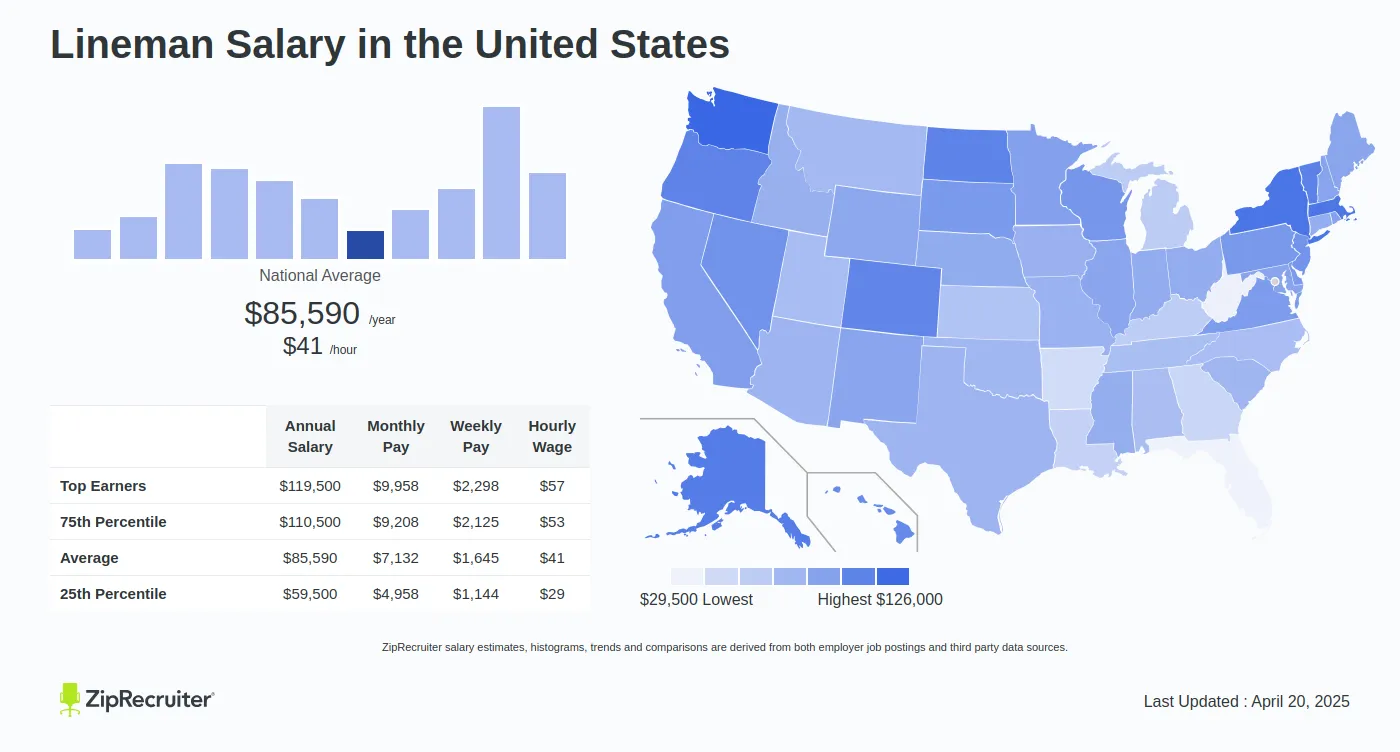Have you ever wondered how much a linesman gets paid? Whether you’re considering a career in this field or simply curious about the earning potential, understanding the average salary of a linesman can provide valuable insight. From electrical power lines to telecommunications cables, these skilled professionals play a crucial role in maintaining and repairing essential infrastructure. In this article, we’ll explore the average salary range for linesmen and shed light on the factors that can influence their earnings. So, let’s dive into the fascinating world of linesmen salaries and discover what these dedicated individuals can expect to earn.
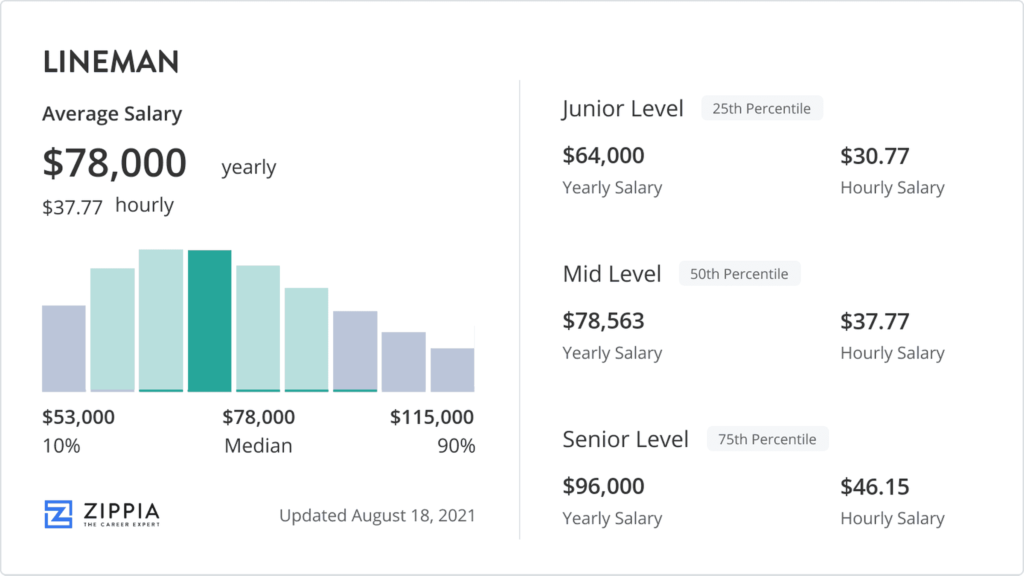
Average Salary of a Linesman
Being a linesman can be a fulfilling and rewarding career choice, and one of the factors that often come to mind when considering a profession is the salary. Linesmen play a crucial role in maintaining and managing the electrical power grid, ensuring that power is delivered safely and efficiently to homes, businesses, and industries. In this article, we will explore the average salary of a linesman, factors affecting their salary, salary ranges at different career levels, and comparison with other similar professions. We will also delve into the average salary by industry, state, and country, as well as highlight additional benefits and perks that linesmen often enjoy. Finally, we will discuss the job outlook for linesmen and conclude with a summary of the key points covered.
Factors Affecting Linesman Salary
Several factors can influence the salary of a linesman. Understanding these factors is essential for both aspiring linesmen and those already in the field, as it can help in making informed decisions about career advancement and salary negotiations.
1. Experience
As in many professions, experience plays a significant role in determining a linesman’s salary. With each passing year, linesmen gain valuable skills and knowledge that contribute to their expertise in the field. Consequently, linesmen with more experience tend to earn higher salaries than those who are just starting out. However, it is important to note that experience alone may not be the sole determinant of salary, as other factors come into play as well.
2. Location
Geographic location is another crucial factor that affects a linesman’s salary. Different regions have varying costs of living, economic conditions, and demand for linesmen. Generally, linesmen working in metropolitan areas or in regions with a high demand for skilled labor may command higher salaries due to the increased competition for their services. On the other hand, linesmen in rural areas or regions with a lower demand may experience lower salary ranges.
3. Company Size
The size and nature of the company a linesman works for can also influence their salary. Large utility companies or electrical contractors that handle large-scale projects may be able to provide higher salaries compared to smaller companies. Additionally, larger companies often offer more comprehensive benefits packages, further enhancing the overall compensation for linesmen.
4. Union Membership
Many linesmen choose to join labor unions to protect their rights and negotiate fair compensation. Union membership can positively impact a linesman’s salary, as unions often negotiate collective bargaining agreements that set minimum wage standards and provide benefits like healthcare and retirement plans. Unions also ensure job security and protect workers from unfair treatment.
5. Education and Training
While formal education and training are not always required to become a linesman, they can significantly impact salary potential. Linesmen with advanced degrees or specialized certifications may be sought after by employers and can command higher salaries. Additionally, ongoing professional development and training can open up opportunities for career advancement and salary increases in the field.
Salary Range for Linesman
The salary range for linesmen can vary depending on various factors such as experience, location, and industry. Let’s explore the different salary levels commonly seen in the linesman profession.
1. Entry-level Linesman Salary
As an entry-level linesman, you can expect to earn a starting salary that may range from $40,000 to $60,000 per year. This initial salary is typically reflective of the base pay and may increase as you gain experience and expertise in the field.
2. Mid-level Linesman Salary
After working in the field for a few years and gaining experience, linesmen can progress to mid-level positions. The salary range for mid-level linesmen usually falls between $60,000 and $80,000 per year. At this stage, advancements in salary can be influenced by factors such as additional certifications, increased responsibilities, and performance evaluations.
3. Senior-level Linesman Salary
Senior-level linesmen who have extensive experience and expertise in their field can command higher salaries. The salary range for senior-level linesmen typically starts around $80,000 per year and can go well above $100,000 per year. At this level, salary increments may be based on factors such as exemplary performance, leadership roles, and specialized skills.
Comparison with Other Similar Professions
To gain a better understanding of how a linesman’s salary compares to other similar professions, let’s explore a few relevant occupations.
1. Electrical Power Installers and Repairers
Electrical power installers and repairers perform tasks similar to linesmen, but their primary focus is on installing and maintaining electrical systems within buildings and facilities. On average, the salary for electrical power installers and repairers falls within a similar range as linesmen, with mid-level positions typically earning around $60,000 to $80,000 per year.
2. Electricians
Electricians are responsible for installing, repairing, and maintaining electrical systems in residential, commercial, and industrial settings. While there are similarities between electricians and linesmen, electricians typically earn slightly lower salaries compared to linesmen. The salary range for electricians commonly falls between $50,000 and $70,000 per year.
3. Telecommunications Line Installers and Repairers
Telecommunications line installers and repairers focus on installing and repairing communication lines, such as telephone and internet cables. Although their work overlaps with linesmen in certain areas, their specific expertise in telecommunications sets them apart. The average salary for telecommunications line installers and repairers is typically lower than that of linesmen, with a range of $40,000 to $60,000 per year.
It’s important to note that these figures are approximate and can vary based on factors such as location, experience, and industry demand.
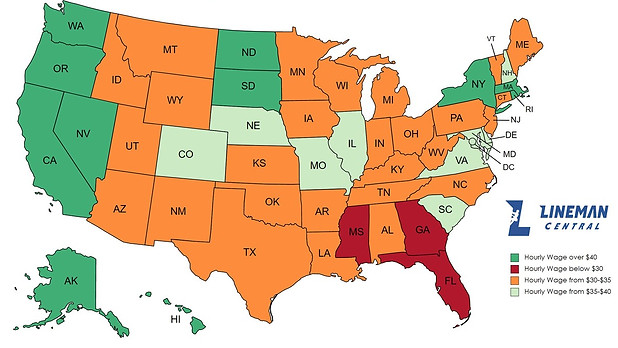
Average Salary by Industry
The industry in which a linesman works can also impact their salary. Let’s examine the average salary of linesmen in different industries.
1. Electric Power Generation, Transmission, and Distribution
Linesmen working in electric power generation, transmission, and distribution typically earn salaries at the higher end of the spectrum due to the specialized nature of their work. The average salary in this industry ranges from $60,000 to $90,000 per year.
2. Local Government
Linesmen employed by local government entities, such as municipal utility departments, often enjoy competitive salaries and benefits. On average, linesmen working in local government earn a salary ranging from $50,000 to $80,000 per year.
3. Utility System Construction
Utility system construction companies, which specialize in building and installing infrastructure for electrical power systems, also offer attractive salary packages to linesmen. The average salary in this industry falls within the range of $60,000 to $85,000 per year.
It’s worth noting that the demand for linesmen and industry-specific factors can influence salary ranges in each sector.
Average Salary by State
Different states within a country may offer variations in salary due to regional differences. Let’s take a look at the average salary for linesmen in some prominent states.
1. Texas
Texas is known for its extensive infrastructure and robust energy sector, making it a promising location for linesmen. The average salary for linesmen in Texas ranges from $50,000 to $80,000 per year.
2. California
California, with its high cost of living and strong emphasis on renewable energy, presents linesmen with lucrative opportunities. The average salary for linesmen in California hovers around $60,000 to $90,000 per year.
3. New York
In New York, where urban areas like New York City and Buffalo offer abundant job prospects, linesmen can expect salaries ranging from $60,000 to $85,000 per year on average.
It is important to consider that while these figures provide a general idea, local factors such as cost of living, demand, and market conditions may cause fluctuations in salary ranges.
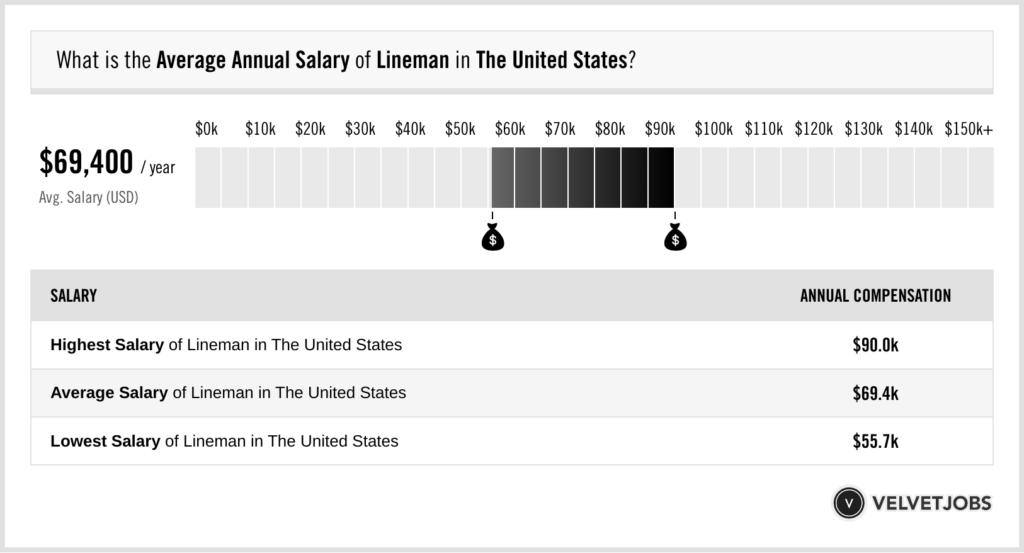
Average Salary by Country
The salary of a linesman can also vary based on the country in which they are employed. Let’s explore the average salary for linesmen in a few countries.
1. United States
Linesmen in the United States enjoy competitive salaries, with the average ranging from $50,000 to $80,000 per year. The strong demand for skilled linesmen and the extensive electrical infrastructure in the country contribute to the attractive compensation.
2. Canada
In Canada, linesmen can expect similar salary ranges as their counterparts in the United States. The average salary for linesmen in Canada falls within the range of $50,000 to $80,000 per year.
3. Australia
Australia, with its unique geographic challenges and extensive power infrastructure, offers linesmen competitive salaries. The average salary for linesmen in Australia typically ranges from $70,000 to $100,000 per year.
Salary ranges in each country can be influenced by factors such as job demand, cost of living, and industry-specific dynamics.
Additional Benefits and Perks
In addition to competitive salaries, linesmen often enjoy a range of benefits and perks. These can vary depending on the employer and industry but may include:
- Health insurance: Many employers provide comprehensive health insurance coverage for linesmen and their families.
- Retirement plans: Linesmen may have access to retirement plans, such as a 401(k) or pension, providing them with financial security in their later years.
- Paid time off: Linesmen often receive paid vacation days, sick leave, and holidays.
- Educational opportunities: Some employers may offer educational opportunities, scholarships, or reimbursement for further education and training.
- Safety gear and tools: Employers typically provide linesmen with the necessary safety gear, tools, and equipment required for the job.
- Overtime pay: Linesmen may be eligible for overtime pay for hours worked beyond the standard workweek, providing additional income.
The specific benefits and perks available can vary from company to company, highlighting the importance of considering the overall compensation package when evaluating job opportunities.
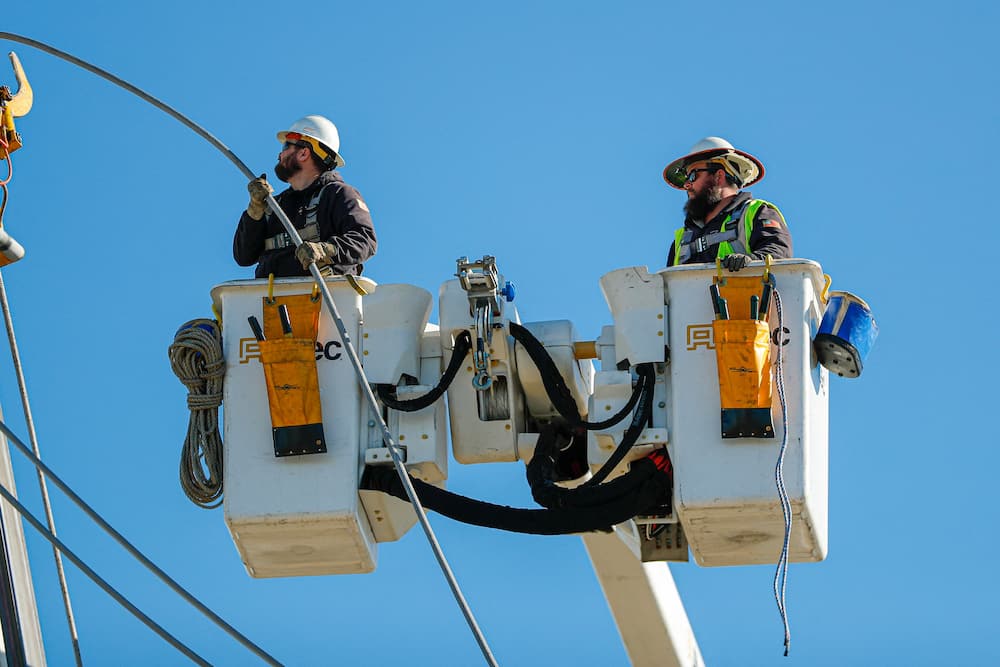
Job Outlook for Linesman
The job outlook for linesmen remains promising, driven by ongoing infrastructure development, increasing renewable energy adoption, and the need for skilled professionals to maintain existing power grids. As the demand for electricity continues to grow, so does the need for well-trained linesmen. According to the U.S. Bureau of Labor Statistics, the employment of power line installers and repairers is projected to grow by 4% from 2020 to 2030, with an increasing emphasis on renewable energy projects.
The demand for linesmen can also be influenced by factors such as population growth, technological advancements, and government policies. As the world becomes more reliant on electricity for everyday activities, linesmen will continue to play a vital role in ensuring the safe and reliable delivery of power.
Conclusion
In conclusion, the average salary of a linesman varies depending on factors such as experience, location, company size, union membership, and education and training. Entry-level linesmen can expect a starting salary of around $40,000 to $60,000, which increases as they progress to mid-level and senior-level positions. While linesmen earn competitive salaries when compared to similar professions, factors such as industry, state, and country can also impact their earnings. Linesmen enjoy additional benefits and perks, such as health insurance, retirement plans, and educational opportunities. The job outlook for linesmen remains positive, thanks to ongoing infrastructure development and the increasing demand for electricity. Whether you are considering a career as a linesman or are simply curious about their salaries, understanding the various factors at play can provide valuable insights into this essential profession in the electrical industry.
